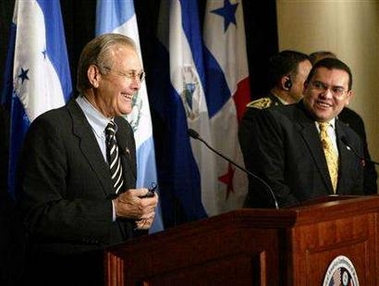|
Rumsfeld departs for Beijing Monday
(chinadaily.com.cn)
Updated: 2005-10-16 10:18
U.S. Defense Secretary Donald Rumsfeld departs Monday on his first visit to
China since 2000, marking a new opening or hopefully a new way of thinking in
the very conservative Pentagon towards a rapidly developing China.
Rumsfeld is scheduled to meet with President Hu Jintao, who also is chairman
of the Central Military Commission, which runs the military, and other senior
officials, including Rumsfeld's counterpart, General Cao Gangchuan, the
Associated Press reported.
As a good will gesture to the Americans, China agreed to allow Rumsfeld to
visit the 2nd Artillery Corps headquarters at Qinghe, which runs its strategic
missile forces. Rumsfeld would be the first U.S. official ever to see the
complex, said Pentagon officials who briefed reporters on the historical trip.

US Defense Secretary Donald H. Rumsfeld (L) at
the US & Central America Ministers Conference on Security and Economic
opportunity in Key Biscayne, Florida, October 13, 2005.
[Reuters] | Secretary Rumsfeld is hoping Beijing
detail more about the scope of its military budget, and will confer closely with
Chinese leaders to fathom Chinese intentions, the Associated Press reported. Up
to now, the Pentagon sees China as a potential threat to U.S. interests in Asia
and a possible global rival in the future.
Rumsfeld leaves Washington with few expectations of major breakthroughs in
the topsy-turvy relationship with China, his aides was quoted as saying. But
many see his visit as bringing the United States and China full-circle from the
most recent low point in relations: the April 2001 collision of a Chinese jet
and a U.S. Navy spy plane in China’s southern coastal sea.
Rumsfeld's visit, only the third by a U.S. defense secretary in the past
decade and the first since 2000, is intended in part as a precursor to a trip
that President Bush plans for November.
Rumsfeld's visit is "long overdue, very welcome, and hopefully will help to
restore some trust and momentum to the U.S.-China military and strategic
relationship," said David Shambaugh, director of the China Policy Program at
George Washington University. "Yet the depth of distrust and misperceptions in
both military establishments toward the other is palpable and not easily
overcome."
Kurt Campbell, who was deputy assistant secretary of defense for Asia and
Pacific affairs during the Clinton administration, said in an interview with the
Associated Press that Rumsfeld's visit is a welcome change of approach for the
Bush administration.
|